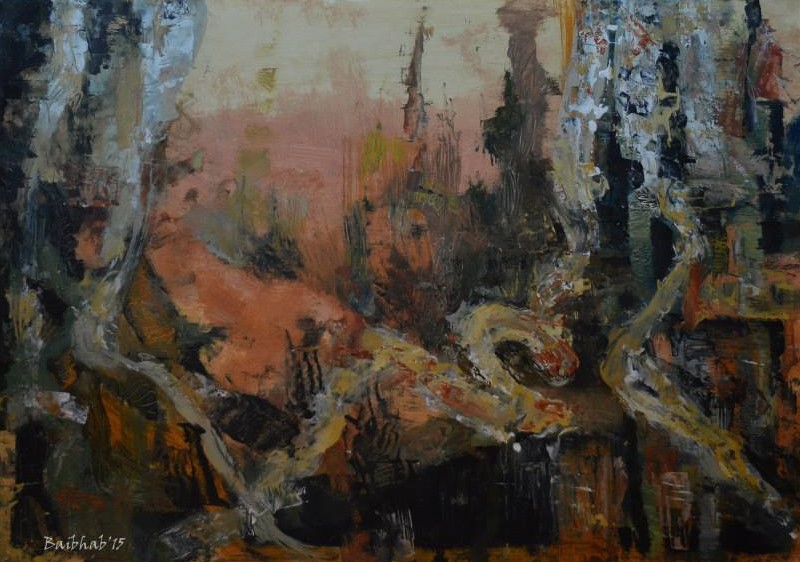Translated from the Bengali by Bishnupriya Chowdhuri

Artwork by Baibhab Bose.
6.
Towards the end of the night, a pitch-dark window rattled by an oceanic explosion woke up. Venus shines phosphorescent against the dark purple frame. Water vapor rolls down the glass. Nipples, from under her slumbering dress—the soft pinkish glow of that smooth elevation… One arm, flung to the edge of the bedsheet—arm which lies long, soft, and still. Arm that wakes up to the glass and brass fineries, holds a sand clock, eye kohl, golden condom, a body butter. Gradually it reaches out to the perfume, to those woolen gloves. The sleeping girl’s breath steps into the dressing room/salon. A terrible paw closes in on smelling the sleeping girl. All of a sudden, she wakes up from a dream at the explosion.
She runs, all soaked in sweat across the waters and mountains, bloodied by the menacing paws of some polar bear. The ruthless fox has chewed off the tips of her ears, and an aggressive bison charges at her belly button.
The woman runs. Hurling over her bed and mattress, she runs in her sleep down the corridor, stairs, and portico, crossing the fallen lot of night-blooming jasmines and twisted red brick lanes, she reaches the morning city street. Her footprints and some vermillion hues on the grass…
Golden earrings drop loose on the black granite under the unfettered agility of her heavy buttocks and voluminous breasts. The dim vision of a beggar woman confuses the object glimmering in the first rays of the morning sun for some unknown, strange virus.
She, long past her prime, engrossed in chanting, smells of dampened jute cloth and water that has washed rice grains. Mild redolence wafts between the folds of her kora saree, curls of hair, the blood and puss on her nails… Suddenly, she picks up the earring and throws it into the sea waves. She keeps staring into the bewildering depth of frothy, nimrod cheer of the water.
The woman sits numb, reassured by her lady’s maid. The bed gets made once again—pillows stacked, sheets stretched over sheets. Any moment now, fruits shall spill from fine china bowls, and coffee will brew. The base of her naval lies warm, smooth, and composed. Consummation has rendered the tips of her ears aglow. They shiver at the newly gained knowledge and aspirations. Sunshine plunges over the curtains, restless discussing all about dreams-love and violence. Discussions roiled at the tables, in the rooms, between the sides of the walls, two sonorous banks of the river, the hanging bridges, and half restaurants, long corridors, the unbarred window on the twelfth floor, in the reading room, laboratories, demonstrations, and boardrooms. It goes on inside the maternity wards, wedding ceremonies, and funerary gatherings, it goes on and on—the endless matters of the children, youth, and the old.
After they survived the death of ten thousand sons, Prajapati Daksha and Devi Asikni gave birth to sixty daughters. Arundhati and Sankalpaa were among the ten that Daksha had given away to Dharma. Arundhati was the mother of all matters of the world and from Sankalpaa’s womb was born Sankalpa, the concept of determination.
7.
A red telephone lies crushed. The heavy wheels of the truck whooshed passed. The broken red bits float in the thick dark fluid. Bits of voices—mellifluous and gruff, startled and curious, charming and smitten, alert, driven, emotional, shrieked and chaotic, obedient sounds, questions, and desires. Some of them are yellowish, golden, and burnt sienna. Dense like a crushed pear, sugar crystals, curdled milk, swarmed by red ants. A flock of culex mosquitoes flying in to lay eggs over it. A few men in gumboots, blue apron rubber gloves, and green buckets begin to pick up those red crushed bits. No one can tell, it used to be a telephone.
“Is this really the corpse of a red telephone?” asked someone.
“Maybe it’s just a symbol or a metaphor?” wondered another.
“What’s the name? What was the number?” they keep enquiring…
“We need to inform the head office,” the white glove suggested, concerned.
“But the entire thing got smashed,” observed the blue apron.
The rubber hands scraped and collected the pieces and put them in a trash-trolly. Voices that were mellifluous, gruff, enchanting, terrified, and emotional congealed in a muck in the street. Voices that used to cross the wire from the lips to the ears.
Lips, chapped, cracked bloodless, and dark. Like the nicotine leaves or the dark piscine fat. Bold, trembling, calm. Split like white cowrie shells, smelling of milk and garlic. Swollen, soft, audacious, and wet.
Lips, purple like ripened pomegranate. Those who flew across the wires to far, faraway ears. Those ears—dark, furry, oily, restless, cold, mauve, blood-hued, tender. Golden earrings swung at their fragrance. Neem sticks, golden studs… the danglers jingled—now spattered as mud by the road—those voices.
Those who poke and probe into the rejected matters of life with their fingers, nails, or an iron pick, those herds of street urchins have now surrounded it.
“Wha’ the fuck is this ‘posed to be?”—asked one junior to his baldy buddy. “Oye Parul, come quick… take a look at this”—pre-pubescent sister called out to her younger one. (“Oh, Girl your skirt is full of holes”) “See, it’s moving… mus’ be alive”—they picked it with a stick. Two words “thirst” and “kiss” jumped up at them. Startled, they took a few steps back. One parted his legs and urinated over it.
Warm water meandered to the drain carrying those half-used phrases. Street gets spic and span, unspoiled. Faraway—elegant, childhood, is not keeping well, eyes overflowing, longing… words crawl towards the drain. “Kiss” only once did the word jump, sudsy, and touched the emaciated girl named Parul. She keeps crying by the manhole, alone… all alone.
The above is the last of the series, a continuation of the first and the second parts that were published in The Antonym earlier. To read the earlier parts, please click on the following links:
Also read three Bengali poems by Tanushree Bag, translated into English by Moulinath Goswami, and published in The Antonym:
Follow The Antonym’s Facebook page and Instagram account for more content and exciting updates.



























0 Comments